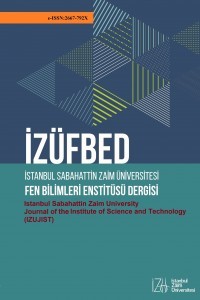Elektronik Sınav Sistemlerine Yönelik Siber Saldırılara Karşı Önleyici Yöntemler: LEUKOLION Örneği
uzaktan öğretim, siber saldırı, gözetimli sınav, elektronik sınav
Cyber Attack and Deterrent Methods Againts Electronic Exam Systems: A Case of Leukolion
___
- F. Aslay, «Siber Saldırı Yöntemleri ve Türkiye’nin Siber Güvenlik Mevcut Durum Analizi,» International Journal of Multidisciplinary Studies and Innovative Technologies, cilt 1, no. 24-28, p. 1, 2017.
- İ. Kara, «Kaba Kuvvet Saldırı Tespiti ve Teknik Analizi,» Journal of Computer and Information Sciences, cilt 2, no. 2, pp. 61-69, 2019.
- M. Şenol, «Türkiye'de Siber Saldırılara Karşı Caydırıcılık,» Uluslararası Bilgi Güvenliği Mühendisliği Dergisi, cilt 3, no. 2, pp. 1-9, 2017.
- E. Masum ve R. Samet, «Mobil BOTNET İle DDOS Saldırısı,» Bilişim Teknolojileri Dergisi, cilt 11, no. 2, pp. 111-121, 2018.
- M. Tekerek, «Bilgi Güvenliği Yönetimi,» KSÜ Doğa Bilimleri Dergisi, cilt 1, no. 132-137, p. 11, 2008.
- K. Singh, K. S. Dhindsa ve B. Bhushan, «Threshold-based distributed DDoS attack detection in ISP networks,» Turkish Journal of Electrical Engineering and Computer Science, cilt 26, no. 4, pp. 1796-1811, 2018.
- M. Özgen ve S. Düz, Tehnoscape: Geleceğin Teknolojileri 2020, Ankara: Türkiye Teknoloji Geliştirme Vakfı (TTGV), 2019.
- M. Kuyucu, «Y Kuşağı ve Teknooji: Y kuşağının iletişim teknolojilerini kullanım alışkınlıkları,» Gümüşhane Üniversitesi İletişim Fakültesi Elektronik Dergisi, cilt 5, no. 2, pp. 845-872, 2017.
- G. Kurubacak, «Açık ve uzaktan öğrenmede ölçme ve değerlendirme özel sayısı,» Açıköğretim Uygulamaları ve Araştırmaları Dergisi, cilt 1, no. 1-3, p. 4, 2018.
- A. Kennedy, «Understanding the Impact of Deepfake Videos,» 2020. [Çevrimiçi]. Available: https://www.linkedin.com/learning/understanding-the-impact-of-deepfake-videos/the-strange-reality-of-deepfake-media. [Erişildi: 1 Aralık 2020].
- G. Joanna, P. Mariusz, P. Gebski, A. Zarzeka, J. Belowska ve M. Malczyk, «Comparision of opinions of students and university teachers from medical Universy of Warswa on e-Assessment - A preliminary report,» The Eurasia Proceedings of Educational and Social Sciences, cilt 5, no. 1, pp. 1-9, 2016.
- P. Erten, «Z Kuşağının Dijital Teknolojiye Yönelik Tutumları,» Gümüşhane Üniversitesi Sosyal Bilimler Enstitüsü Elektronik Dergisi, cilt 10, no. 1, pp. 190-202, 2019.
- A. Bozkurt ve H. Uçar, «E-Öğrenme ve E-Sınavlar: Çevrimiçi Ölçme Değerlendirme Süreçlerinde Kimlik Doğrulama Yöntemlerine İlişkin Öğrenen Görüşlerinin İncelenmesi,» Mersin Üniversitesi Eğitim Fakültesi Dergisi, cilt 14, no. 2, pp. 745-755, 2018.
- G. Başol, T. K. Ünver ve H. Çiğdem, «Ölçme Değerlendirme Dersinde E-Sınav Uygulanmasına İlişkin Öğrenci Görüşleri,» Uluslararası Türk Eğitim Bilimleri Dergisi, cilt 5, no. 8, pp. 111-128, 2017.
- B. Başaran, M. Yalman ve S. Erkan, «İlahiyat Uzaktan Eğitim Lisans Tamamlama Programlarında Teknoloji Kullanımı ve e-Sınavlara Yönelik Öğrenci Tutumlarının Değerlendirmesi,» Hitit Üniversitesi İlahiyat Fakültesi Dergisi, cilt 31, no. 277-299, p. 16, 2017.
- S. Atasever, İ. Özçelik ve Ş. Sağıroğlu, «Siber Terör ve DDoS,» Süleyman Demirel Üniversitesi Fen Bilimleri Enstitüsü Dergisi, cilt 23, no. 1, pp. 238-244, 2019. N. Alrıwais, G. Wills ve M. Wald, «Identifying factors that affect the acceptance and use of e-assessment by academics in Saudi universities,» International E-Journal of Advances in Education, cilt 2, no. 4, pp. 132-140, 2016.
- M. Akyıldız, «Açık ve uzaktan öğrenmede ölçme ve değerlendirme,» Açıköğretim Uygulamaları ve Araştırmaları Dergisi, cilt 4, no. 1, pp. 1-4, 2018. D. Akaslan, «Uzaktan Eğitim Uygulama ve Araştırma Merkezleri için Elektronik Sınav Sistemine Geçiş Örneği,» %1 içinde International Open & Distance Learning Conference, Eskişehir, 2019.
- D. Akaslan ve E. L.-C. Law, «Measuring teachers' readiness for E-learning in higher education institutions associated with the subject of electricity in Turkey,» %1 içinde 2011 IEEE Global Engineering Education Conference (EDUCON), Amman, 2011a.
- D. Akaslan ve E. L.-C. Law, «Measuring Student E Learning Readiness A Case about the Subject of Electricity in Higher Education Institutions in Turkey,» %1 içinde 2011 International Conference on Web-based Learning (ICWL), Hong Kong, 2011b.
- D. Akaslan ve S. Taşkın, MATLAB ile Teknik Programlama, İstanbul: Papatya Yayıncılık, 2015.
- D. Akaslan ve Ü. Kul, «Are Pre service Teachers Ready for E learning A Case of Artvin Coruh University,» Journal of Turkish Studies, cilt 12, no. 1, pp. 1-20, 2017.
- D. Akaslan, «Aday ve Görevli İşlemleri için Merkezi Sınav Sistemi,» %1 içinde 6. Uluslararası GAP Mühendislik Kongresi, Şanlıurfa, 2018.
- S. M. Arıkan ve R. Benzer, «Bir Güvenlik Trendi: Bal Küpü,» ACTA INFOLOGICA, cilt 2, no. 1, pp. 1-11, 2018.
- Yayın Aralığı: Yılda 2 Sayı
- Başlangıç: 2019
- Yayıncı: İstanbul Sabahattin Zaim Üniversitesi
Eğirdir Gölü Çevresinde Yenilenebilir Enerji Uygulamaları
Salih ÖZALTIN, Ahmet Korhan BİNARK
Açık Kaynak Kod Türkçe Doğal Dil İşleme Kütüphanelerinin Robotik Uygulamalarda Kullanımı
Kadir ARAM, Gökhan ERDEMİR, Burhanettin CAN
Su Kirliliği Nedenleri, Olumsuz Etkileri ve Önleme Yöntemleri
Nefes Terapisinin Genel Sağlık Ve Kadın Sağlığı Üzerine Ekileri
Zeynep KEREM ÖZTÜRK, Mertcan YILMAZ
AHP ve CODAS Yöntemi ile Emniyet Personeli Performans Ölçümü
Şantiyelerde Risk Değerlendirmesinin PHL Tekniği İle İrdelenmesi
Selim TAŞKAYA, Muhammed Fatih CAN
Dünya ve Türkiye’de gıda israfı ve kaybına genel bir bakış
İsmail Hakkı TEKİNER, Nesli Nur MERCAN, Ayşegül KAHRAMAN, Mervenur ÖZEL
Elektronik Sınav Sistemlerine Yönelik Siber Saldırılara Karşı Önleyici Yöntemler: LEUKOLION Örneği
